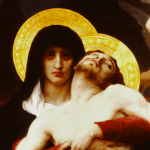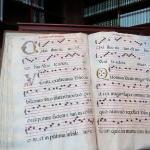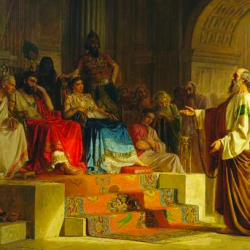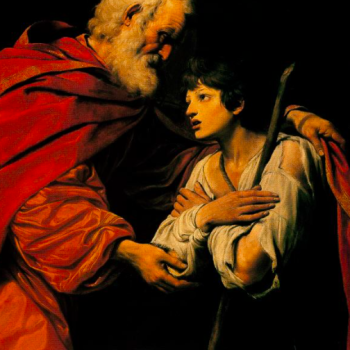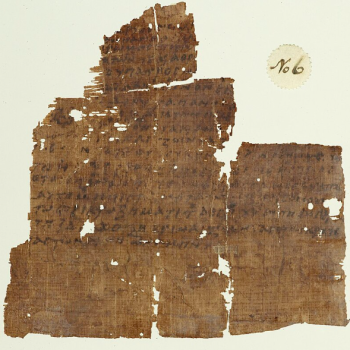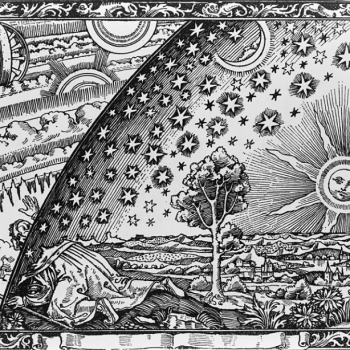Palm Sunday
In the rash lustihead of my young powers,
. I shook the pillaring hours
And pulled my life upon me; grimed with smears,
I stand amid the dust o’ the mounded years—
My mangled youth lies dead beneath the heap.
My days have crackled and gone up in smoke,
Have puffed and burst as sun-starts on a stream.
. Yea, faileth now even dream
The dreamer, and the lute the lutanist;
Even the linked fantasies, in whose blossomy twist
I swung the earth a trinket at my wrist,
Are yielding; cords of all too weak account
For earth with heavy griefs so overplussed.
. Ah! is Thy love indeed
A weed, albeit an amaranthine weed,
Suffering no flowers except its own to mount?
. Ah! must—
. Designer infinite!—
Ah! must Thou char the wood ere Thou canst limn with it?
My freshness spent its wavering shower i’ the dust;
And now my heart is as a broken fount,
Wherein tear-drippings stagnate, spilt down ever
. From the dank thoughts that shiver
Upon the sighful branches of my mind.
. Such is; what is to be?
The pulp so bitter, how shall taste the rind?
I dimly guess what Time in mists confounds;
Yet ever and anon a trumpet sounds
From the hid battlements of Eternity;
Those shaken mists a space unsettle, then
Round the half-glimpsèd turrets slowly wash again.
. But not ere him who summoneth
. I first have seen, enwound
With glooming robes purpureal, cypress-crowned;
His name I know, and what his trumpet saith.
Whether man’s heart or life it be which yields
. Thee harvest, must Thy harvest-fields
. Be dunged with rotten death?
—Francis Thompson, “The Hound of Heaven”
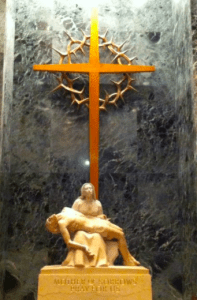
Fig Monday
We are all hollow and empty; ’tis not with wind and voice that we are to fill ourselves; we want a more solid substance to repair us: a man starving with hunger would be very simple to seek rather to provide himself with a gay garment than with a good meal: we are to look after that whereof we have most need. As we have it in our ordinary prayers: Glory be to God on high, and on earth peace to men. We are in want of beauty, health, wisdom, virtue, and such like essential qualities: exterior ornaments should be looked after when we have made provision for necessary things. … And, in truth, experience makes us sensible of many very hurtful treasons in glory. There is nothing that so poisons princes as flattery, nor anything whereby wicked men more easily obtain credit and favor … The first charm the Sirens made use of to allure Ulysses is of this nature: Come hither to us, O admirable Ulysses, come hither, thou greatest ornament and pride of Greece.
… These discourses are, in my opinion, very true and rational; but we are, I know not how, double in ourselves, which is the cause that what we believe we do not believe, and cannot disengage ourselves from what we condemn.
—Michel de Montaigne, “Of Glory,” Essais
Temple Tuesday
To explore the womb, or tomb, or dreams; all these are usual
Pastimes and drugs, and features of the press:
And always will be, some of them especially
When there is distress of nations and perplexity
Whether on the shores of Asia, or in the Edgware Road.
Men’s curiosity searches past and future
And clings to that dimension. But to apprehend
The point of intersection of the timeless
With time, is an occupation for the saint—
No occupation either, but something given
And taken, in a lifetime’s death in love,
Ardour and selflessness and self-surrender.
For most of us, there is only the unattended
Moment, the moment in and out of time,
The distraction fit, lost in a shaft of sunlight,
The wild thyme unseen, or the winter lightning
Or the waterfall, or music heard so deeply
That it is not heard at all, but you are the music
While the music lasts. These are only hints and guesses,
Hints followed by guesses; and the rest
Is prayer, observance, discipline, thought and action.
The hint half guessed, the gift half understood, is Incarnation.
—T. S. Eliot, Four Quartets, “The Dry Salvages”
Spy Wednesday
Whatever happens, I’ll leave it all to chance
Another heartache, another failed romance, on and on
Does anybody know what we are living for?
I guess I’m learning
I must be warmer now
I’ll soon be turning, round the corner now
Outside the dawn is breaking
But inside in the dark I’m aching to be free
The show must go on
The show must go on
Inside my heart is breaking
My makeup may be flaking
But my smile, still, stays on
—Queen, “The Show Must Go On”

Maundy Thursday
There are no ordinary people. You have never talked to a mere mortal. Nations, cultures, arts, civilizations—these are mortal, and their life is to ours as the life of a gnat. But it is immortals whom we joke with, work with, marry, snub and exploit. … Next to the Blessed Sacrament itself, your neighbor is the holiest object presented to your senses.
—C. S. Lewis, “The Weight of Glory”
Good Friday
The book this comes from is set during a severe persecution of Christianity in seventeenth-century Japan; the conventional sign of apostasy was to place one’s foot upon an object called a phumi-e depicting Christ or the Mother of God, as this was a profound insult. The protagonist, Fr. Rodrigues, came to serve the underground Church in Japan. After a period of ministry, Fr. Rodrigues is captured by the shogunate and placed under the threat that if he does not step on a phumi-e, his flock—but not he—will be tortured and killed. He conforms, and looks back on the experience later:
I, too, stood on the sacred image. For a moment this foot was on his face. It was on the face of the man who has been ever in my thoughts, on the face that was before me on the mountains, in my wanderings, in prison, on the best and most beautiful face that any man can ever know, on the face of him whom I have always longed to love. Even now that face is looking at me with eyes of pity from the plaque rubbed flat by many feet. “Trample,” said those compassionate eyes.
“Trample. Your foot suffers in pain; it must suffer like all the feet that have stepped on this plaque. But that pain alone is enough. I understand your pain and your suffering. It is for that reason that I am here.”
—Shūsaku Endō, Silence
Note: the translation here used has “Trample!” in both cases; however, I’m given to understand the Japanese uses a permissive verb, not an imperative. I’m normally loth to change anything I quote, out of respect for the original author, but I don’t have the same level of reverence for translators!
Holy Saturday
Man cenuva lumbar ahosta
Menel acúna
ruxal’ ambonnar,
ëar amortala,
undumë hácala,
enwina lúmë
elenillor pella
talta-taltala
atalantië mindonnar?
Man tiruva rácina cirya
ondolissë mornë
nu fanyarë rúcina,
Anar púrëa tihta
axor ilcalannar
métim’ auressë?
Man cenuva métim’ andúnë?
Who shall see the clouds gather,
the heavens bending upon crumbling hills,
the sea upheaving,
the abyss yawning,
the ancient darkness from beyond the stars
collapsing
upon fallen towers?
Who shall heed a broken ship
on the black rocks
under a shattered sky,
the smeared Sun peering
upon gleaming bones
in the last day?
Who shall see the last sunset?
—J. R. R. Tolkien, Markirya (“The Ark”)
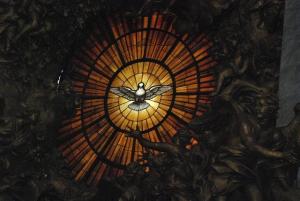
Easter Sunday
Bring me my Bow of burning gold:
Bring me my arrows of desire:
Bring me my Spear: O clouds unfold!
Bring me my Chariot of fire!
I will not cease from Mental Fight,
Nor shall my sword sleep in my hand:
Till we have built Jerusalem,
In Englands green & pleasant land.
—William Blake, “Jerusalem”


